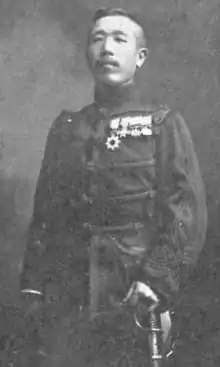Yuki no Shingun
"Yuki no Shingun"(雪の進軍) "The Snow March" is a Japanese gunka composed in 1895 by Imperial Japanese Army musician Nagai Kenshi who reflected his experience in the Battle of Weihaiwei during the First Sino-Japanese War.[1][2] The song was banned in the Imperial Japanese Army during World War II and was used in the 1977 film Mount Hakkoda.
Background

During the Battle of Weihaiwei, the Imperial Japanese Army experienced heavy snow and low temperature, while being under-equipped with water, food and fuel.[3] Nagai reflected in his song the hardship Japanese soldiers experienced and their discontentment about the war.[4] The song, which was popular at the time of its publication[5] and is described by scholars to have an upbeat melody,[6][7] was said to be favoured by Ōyama Iwao.[8] It was also taught and sung in Japanese schools during the late Meiji period.[9]
Nagai's song was later widely referred to by soldiers during the Second Sino-Japanese War and the Pacific War. The discontentment about the war and the disillusionment about the patriotic propaganda expressed in the song were viewed as antagonistic to Japanese militarism and prohibited by the Imperial Japanese Army, though the effectiveness of the order was in doubt.[10]
Lyrics
_(1911).jpg.webp)
| Kyūjitai | Shinjitai | Rōmaji | English Translation |
|---|---|---|---|
|
どれが |
Yuki no shingun koori wo funde Dore ga kawa yara michi sae shirezu |
Marching in the snow, stepping on ice We can't even tell road from river |
|
なまじ |
Yakanu himono ni han-nie meshi ni Namaji inochi no aru sono uchi wa |
Dried fish that won't cook becomes our half-boiled meals It's not long before we're living half-boiled days |
|
|
Ki nomi ki no mama kiraku na fushido Hainō makura ni gaitō kaburya |
The clothes we wear are our carefree beds We cover under our overcoats on knapsack pillows |
|
|
Inochi sasagete detekita mi yue Shinuru kakugo de tokkan suredo |
Because we came here offering our lives With a death resolution, even as we charge shouting |
In popular culture
- The 1977 film Mount Hakkoda used "Yuki no Shingun" and associated this song with the Hakkōda Mountains incident.
- The Japanese version of the 2005 video game Destroy All Humans!, released in 2007, referred to the first two lines of the song.[10]
- The 2012 anime Girls und Panzer shows two characters singing the song during a reconnaissance march through the snow, and the anime's sequel film Girls und Panzer der Film[11] uses the melody as a leitmotif for a Japanese-themed school.
References
- Japanese culture in the Meiji era. 3. Toyo Bunka. 1969. p. 483.
- "【北京春秋】日清戦争激戦の地・威海は韓国にも近い タコの躍り食いに思う遠い日々" [Pekin shunjū] nisshinsensō gekisen no ji - Ikai wa Kankoku ni mo chikai, tako no odorigui ni omou tōi hibi [[Beijing spring and autumn] The land of the Sino-Japanese War battle, Weihai is close to South Korea. On distant days I think of eating octopuses]. Sankei Shimbun (in Japanese). 2018-07-13. Retrieved 2019-05-11.
- Kamikawa, Taketoshi (2004-07-23). 児玉源太郎: 日露戦争における陸軍の頭脳 Kodama Gentarō: Nichirosensō ni okeru rikugun no zunō [Kodama Gentarō: Army Brain in the Russo-Japanese War] (in Japanese). PHP研究所.
- "永井健子氏が作詞作曲を手掛けた「雪の進軍」について" Nagai Kenshi-shi ga sakushi sakkyoku o tegaketa 'Yuki no shingun' ni tsuite [On "Yuki no Shingun" written by Nagai Kenshi]. Survival Game & Military Map (in Japanese). 2017-11-10. Retrieved 2019-05-11.
- The Japan Year Book. Japan Year Book Office. 1941. p. 1941.
- Rimer, J. Thomas (2014-07-14). Culture and Identity: Japanese Intellectuals during the Interwar Years. Princeton University Press. p. 280. ISBN 9781400861255.
- Washington, Garrett L. (2018-09-13). Christianity and the Modern Woman in East Asia. BRILL. p. 102. ISBN 9789004369108.
- Lone, Stewart (1994-08-30). Japan's First Modern War: Army and Society in the Conflict with China, 1894-5. Springer. p. 95. ISBN 9780230389755.
- May, Elizabeth (1963). The influence of the Meiji period of Japanese children's music. University of California Press. p. 42.
- "雪の進軍" Yuki no shingun [Yuki no Shingun]. world-anthem.com (in Japanese). Retrieved 2019-05-11.
- るるぶ ガールズ&パンツァー Rurubu Gāruzu ando Pantsā [Rurubu Girls und Panzer] (in Japanese). Jtbパブリッシング. 2015-07-24. p. 35. ISBN 9784533106095.
External links
- The song sung on Youtube with Japanese (romaji) and English subtitles